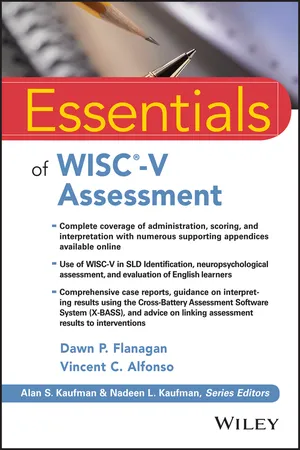
- English
- ePUB (mobile friendly)
- Available on iOS & Android
Essentials of WISC-V Assessment
About this book
Essentials of WISC-V Assessmentprovides step-by-step guidance for administering, scoring, and interpreting the Wechsler Intelligence Scale for Children (WISC-V). Packed with practical tips for more accurate assessment, this informative guide includes numerous case studies that illustrate a range of real-world issues. Special attention is devoted to the assessment of individuals who have significant learning difficulties, such as learning disabilities, and who speak English as a second language. The WISC-V is a valuable assessment tool, but it must be administered and scored appropriately to gain meaning from score interpretation. This book gives you an in-depth understanding of the WISC-V assessment and interpretive process to assist practitioners in:
- Conducting efficient and informative WISC-V assessments
- Utilizing WISC-V in cross-battery and neuropsychological assessment
- Applying WISC-V in the identification of specific learning disabilities
- Utilizing WISC-V in nondiscriminatory assessment of English language learners
- Writing theory-based WISC-V reports
- Linking WISC-V findings to interventions based on individual performance
As the world's most widely-used intelligence test for children, the WISC-V is useful in diagnosing intellectual disabilities and specific learning disabilities, as well as in identifying giftedness. In this volume, sample reports demonstrate how WISC-V assessment results may be linked to interventions, accommodations, modifications, and compensatory strategies that facilitate positive outcomes for children. Essentials of WISC-V Assessment is the all-in-one practical resource for both students and practitioners. The book can be used on its own or with companion software (purchased separately) that provides a user-friendly tool for producing psychometrically and theoretically defensible interpretations of WISC-V performance, and may be used to develop interventions based on each child's strengths and weaknesses.
Tools to learn more effectively

Saving Books

Keyword Search

Annotating Text

Listen to it instead
Information
One
Overview of the WISC-V
Under all conditions, human beings are and remain the centers of their own psychological life and their own worth. In other words, they remain persons, even when they are studied and treated from an external perspective with respect to others' goals. . . . Working “on” a human being must always entail working “for” a human being. (Trans. Lamiell, 2003, pp. 54–55)
From Prediction to Prevention
...Table of contents
- Cover
- Title Page
- Copyright
- Dedication
- Acknowledgments
- Series Preface
- Foreword
- Chapter One: Overview of the WISC-V
- Chapter Two: How to Administer the WISC-V
- Chapter Three: How to Score the WISC-V
- Chapter Four: How to Interpret the WISC-V
- Chapter Five: Strengths And Weaknesses of the WISC-V
- Chapter Six: A Neuropsychological Approach to Interpretation of the WISC-V
- Appendix 6.A: Cognitive Constructs Assessed with the WISC-V Subtests
- Appendix 6.B: Behavior Observations and Process-Oriented Assessment at the Subtest, Item, and Cognitive Construct Levels
- Appendix 6.C: Cluster Analysis Interpretation
- Appendix 6.D: Subtest and Process Score Comparison Worksheets
- Chapter Seven: Use of the WISC-V in the Identification of Specific Learning Disabilities
- Appendix 7.A: Factors That May Facilitate Learning and Aid in ByPassing or Minimizing the Effects of Deficits
- Chapter Eight: Illustrative Case Report
- Appendix 8.A: CBRS Scores
- Appendix 8.B: Cross-Battery Assessment Software System (X-BASS): Dual-Discrepancy/Consistency Model: PSW Results for AMANDA FARRIS
- Chapter Nine: Assessment of English Learners With the WISC-V
- Chapter Ten: WISC-V and Q-interactive
- Epilogue: Dorothea McCarthy Remembered
- About the Authors
- Contributors
- Index
- End User License Agreement
Frequently asked questions
- Essential is ideal for learners and professionals who enjoy exploring a wide range of subjects. Access the Essential Library with 800,000+ trusted titles and best-sellers across business, personal growth, and the humanities. Includes unlimited reading time and Standard Read Aloud voice.
- Complete: Perfect for advanced learners and researchers needing full, unrestricted access. Unlock 1.4M+ books across hundreds of subjects, including academic and specialized titles. The Complete Plan also includes advanced features like Premium Read Aloud and Research Assistant.
Please note we cannot support devices running on iOS 13 and Android 7 or earlier. Learn more about using the app